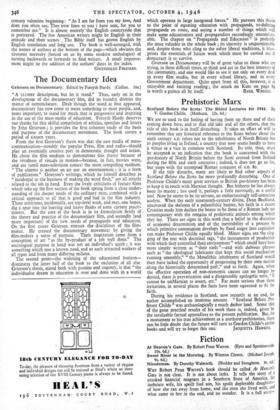Prehistoric Marx
WE are so used to the feeling of having them up there and of their coming down here, and to that old joke and all the others, that the title of this book is in itself disturbing. It takes an effort of will to remember that any historical reference to the Scots before about the sixth century A.D. refers not to the inhabitants of North Britain but to peoples living in Ireland, a country that now seems hardly to have a virtue or a vice in common with Scotland. Its title, then, must be accepted' as an indication that the book is concerned with the pre-history of North Britain before the Scoti crossed from Ireland during the fifth and sixth centuries ; indeed, it does not go so far, but stops with the attempted 'Roman conquest of A.D. 80.
If the title disturbs, many are likely to find other aspects of Scotland Before the Scots far more profoundly disturbing. One of Professor Childe's many great services to British pre-history has been to keep it in touch with Marxian thought_ But hitherto he has always been its master ; has used it, perhaps a little nervously, as a useful tool. Now he seems to be its servant, an embarrassingly self-conscious acolyte. When the early nineteenth-century divine, Dean Buckland, uncovered the skeleton of a palaeolithic hunter, his faith in a recent Creation made him declare the bones to be those of a Roman lady not contemporary with the remains of prehistoric animals among which they lay. There are signs in this work that a belief in the doctrines of economic determinism and of the inevitability of a process h) which primitive communism develops by fixed stages into capitalism can make Professor Childe equally blind. Minor signs are the clog- ging of the text with doctrinal tags, " the instruments of productior with which they controlled their environment " which could have been more simply written as " their tools "—and with dubious phrases such as " the ideological lubricants that kept this social mechanism running smoothly," " the Mesolithic inhabitants of Scotland would then have lacked the opportunity of progressing by their own motion along the historically determined path," and so forth. Again, when the effective operation of non-economic causes can no longer be denied, there is prevarication and a disagreeably apologetic note, " It cannot be unMarxian to assert, etc." Far more serious than these irritations, in several places the facts have been squeezed to fit the faith.
During his residence in Scotland, now recently at an end, the author accomplished an immense amount. " Scotland Before Pro-
fessor Childe " was archaeologically a much darker land. Some idea
of the great practical results of his work there is, indeed, given by the invaluable factual appendices to the present publication. But, for a monument to his true achievement as a northern prehistorian, there can be little doubt that the future will turn to Gordon Childe's earlier books and will try to forget this one. JACQUETTA HAWKES.






























 Previous page
Previous page